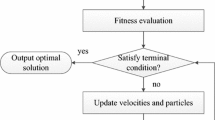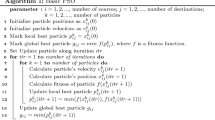Abstract
Particle swarm optimization, a widely used metaheuristic algorithm, mimics the cooperation behavior among species. The PSO algorithm has become a new trend owing to its simplicity and strong optimization capacity. However, premature convergence problem is also a serious issue for PSO comparable with other evolutionary algorithms. Diversity loss is generally known as one of the major causes. For enhancing the diversity of swarms during optimization procedure, an improved PSO algorithm named OLAR-PSO-d is proposed, which incorporates design of experiment technique as well as adaptive reset operator into standard PSO. The OLAR-PSO-d algorithm is compared with other 10 heuristic algorithms. The numerical experiments’ results demonstrate the priority of OLAR-PSO-d both in optimization ability and algorithm stability. The proposed algorithm is also used in a vehicle lightweight design problem. The auto-body achieves 20.25 kg weight reduction with meeting all the performance requirements of crashworthiness.
Similar content being viewed by others
References
J. Kennedy and R. Eberhart, Particle swarm optimization, Proceedings of IEEE International Conference on Neural Networks, 4 (1995) 1942–1948.
M. Clerc, The swarm and the queen: towards a deterministic and adaptive particle swarm optimization, Proceedings of the 1999 Congress on Evolutionary Computation, 3 (2002) 1957.
M. Clerc and J. Kennedy, The particle swarm–explosion, stability, and convergence in a multidimensional complex space, IEEE Transactions on Evolutionary Computation, 6 (1) (2002) 58–73.
V. Miranda, J. D. H. Martins and V. Palma, Optimizing large scale problems with metaheuristics in a reduced space mapped by autoencoders—application to the wind–hydro coordination, IEEE Transactions on Power Systems, 29 (6) (2014) 3078–3085.
Y. Marinakis, An improved particle swarm optimization algorithm for the capacitated location routing problem and for the location routing problem with stochastic demands, Applied Soft Computing, 37 (C) (2015) 680–701.
B. Haddar, M. Khemakhem, S. Hanafi and C. Wilbaut, A hybrid quantum particle swarm optimization for the multidimensional knapsack problem, Engineering Applications of Artificial Intelligence, 55 (C) (2016) 1–13.
R. C. Eberhart and Y. H. Shi, Guest editorial special issue on particle swarm optimization, IEEE Transactions on Evolutionary Computation, 8 (3) (2004) 201–203.
C. K. Monson and K. D. Seppi, Adaptive diversity in PSO, Proceedings of Genetic and Evolutionary Computation Conference, GECCO 2006, Seattle, Washington, Usa, July (2006) 59–66.
S. M. A. Salehizadeh, P. Yadmellat and M. B. Menhaj, Local optima avoidable particle swarm optimization, Swarm In–telligence Symposium, IEEE (2009) 16–21.
A. Ratnaweera, S. K. Halgamuge and H. C. Watson, Selforganizing hierarchical particle swarm optimizer with timevarying acceleration coefficients, IEEE Transactions on Evolutionary Computation, 8 (3) (2004) 240–255.
J. Riget and J. S. Vesterstrøm, A diversity–guide particle swarm optimizer–the ARPSO, EVALife Technical Report (2002) 2.
M. Pant, T. Radha and V. P. Singh, A simple diversity guided particle swarm optimization, IEEE Congress on Evolutionary Computation CEC 2007, 8 (2007) 3294–3299.
J. Sun, W. Xu and W. Fang, A diversity–guided quantumbehaved particle swarm optimization algorithm, Simulated Evolution and Learning, International Conference, China (2006) 497–504.
H. Wang, H. Sun, C. Li, S. Rahnamayan and J. S. Pan, Diversity enhanced particle swarm optimization with neighborhood search, Information Sciences, 223 (2) (2013) 119–135.
A. Meng, Z. Li, H. Yin, S. Chen and Z. Guo, Accelerating particle swarm optimization using crisscross search, Information Sciences, 329 (C) (2016) 52–72.
J. Kennedy, Small worlds and mega–minds: Effects of neighborhood topology on particle swarm performance, Proceedings of the 1999 Congress on Evolutionary Computation, 3 (1999) 1938.
R. Mendes, J. Kennedy and J. Neves, The fully informed particle swarm: Simpler, maybe better, IEEE Transactions on Evolutionary Computation, 8 (3) (2004) 204–210.
T. Peram, K. Veeramachaneni and C. K. Mohan, Fitnessdistance–ratio based particle swarm optimization, Proceedings of the Swarm Intelligence Symposium (2003).
Y. Li, Z. H. Zhan, S. Lin, J. Zhang and X. Luo, Competitive and cooperative particle swarm optimization with information sharing mechanism for global optimization problems, Information Sciences, 293 (3) (2015) 370–382.
M. D. McKay, R. J. Beckman and WJ. Conover, A comparison of three methods for selecting values of input variables from a computer code, Technometrics, 21 (1979) 239–245.
R. L. Iman and W. J. Conover, Small sample sensitivity analysis techniques for computer models with an application to risk assessment, Communications in Statistics–Theory and Methods, 9 (17) (1980) 1749–1842.
R. C. Eberhart and Y. Shi, Particle swarm optimization: developments, applications and resources, Proceedings of the 2001 Congress on Evolutionary Computation, 1 (2002) 81–86.
Y. H. Shi and R. C. Eberhart, Empirical study of particle swarm optimization, IEEE International Conference on Evolutionary Computation, Washington, DC, USA, 3 (1997) 101–106.
J. Kennedy, The particle swarm: Social adaptation of knowledge, IEEE International Conference on Evolutionary Computation, Indianapolis, Indiana (1997) 303–308.
Y. H. Shi and R. C. Eberhart, A modified particle swarm optimizer, IEEE International Conference on Evolutionary Computation, Anchorage, AK (1998) 69–73.
M. Clerc, Confinements and biases in particle swarm optimization, http://clerc. maurice.free.fr/pso (2006).
R. Jin, W. Chen and A. Sudjianto, An efficient algorithm for constructing optimal design of computer experiments, Journal of Statistical Planning and Inference, 134 (1) (2005) 268–287.
M. D. Morris and T. J. Mitchell, Exploratory designs for computational experiments, Journal of Statistical Planning and Inference, 43 (3) (1995) 381–402.
R. E. Perez and K. Behdinan, Particle swarm approach for structural design optimization, Computers Structures, 85 (19–20) (2007) 1579–1588.
J. Kennedy, Bare bones particle swarms, Proceedings of the 2003 IEEE Swarm Intelligence Symposium (2003) 80–87.
J. J. Liang, A. K. Qin, P. N. Suganthan and S. Baskar, Comprehensive learning particle swarm optimizer for global optimization of multimodal functions, IEEE Transactions on Evolutionary Computation, 10 (2006) 281–295.
Z. H. Zhan, J. Zhang, Y. Li and H. S. H. Chung, Adaptive particle swarm optimization, IEEE Transactions on Systems Man & Cybernetics Part B, 39 (2009) 1362–1381.
J. J. Liang and P. N. Suganthan, Dynamic multi–swarm particle swarm optimizer with local search, Proceedings of The 2005 IEEE Congress on Evolutionary Computation, 1 (2005) 522–528.
R. Storn and K. Price, Differential evolution: A simple and efficient heuristic for global optimization over continuous spaces, Journal of Global Optimization, 11 (1997) 341–359.
S. Rahnamayan, H. R. Tizhoosh and M. M. A. Salama, Opposition–based differential evolution, IEEE Transactions on Evolutionary Computation, 12 (2008) 64–79.
D. Karaboga and B. Basturk, On the performance of artificial bee colony (ABC) algorithm, Applied Soft Computing, 8 (2008) 687–697.
G. P. Zhu and S. Kwong, Gbest–guided artificial bee colony algorithm for numerical function optimization, Applied Mathematics & Computation, 217 (2010) 3166–3173.
E. A. Mohammed, An improved global–best harmony search algorithm, Applied Mathematics & Computation, 222 (2013) 94–106.
M. Khalili, R. Kharrat, K. Salahshoor and M. H. Sefat, Global dynamic harmonysearch algorithm: GDHS, Applied Mathematics & Computation, 228 (2014) 195–219.
H. B. Ouyang, L. Q. Gao and S. Li, Improved global–bestguided particle swarm optimization with learning operation for global optimization problems, Applied Soft Computing, 52 (C) (2016) 987–1008.
L. Zhao, Z. Ping and C. Wei, Multidisciplinary optimization of auto–body lightweight design using modified particle swarm optimizer, 11th World Congress on Structural and Multidisciplinary Optimisation, Sydney Australia (2015).
D. R. Jones, M. Schonlau and W. J. Welch, Efficient global optimization of expensive black–box functions, Journal of Global Optimization, 13 (4) (1998) 455–492.
J. M. Yang, Y. P. Chen, J. T. Horng and C. Y. Kao, Applying family competition to evolution strategies for constrained optimization, Evolutionary Programming Vi, International Conference, Ep97, Indianapolis, Indiana, Usa, April 13–16, 1213 (1997) 201–211.
Author information
Authors and Affiliations
Corresponding author
Additional information
Recommended by Associate Editor Gang-Won Jang
Zhao Liu is a post-doctor of Shanghai Jiao Tong University. He got his Ph.D. degree from Shanghai Jiao Tong University in 2016. Zhao’s research areas include: a) Intelligent optimization algorithm; b) Multidisciplinary optimization design; c) Lightweight design of Autobody; d) Multi-scale optimization design. He is responsible for two national foundation projects of China which are related to the improvement of PSO algorithm.
Rights and permissions
About this article
Cite this article
Liu, Z., Li, H. & Zhu, P. Diversity enhanced particle swarm optimization algorithm and its application in vehicle lightweight design. J Mech Sci Technol 33, 695–709 (2019). https://doi.org/10.1007/s12206-019-0124-5
Received:
Revised:
Accepted:
Published:
Issue Date:
DOI: https://doi.org/10.1007/s12206-019-0124-5




